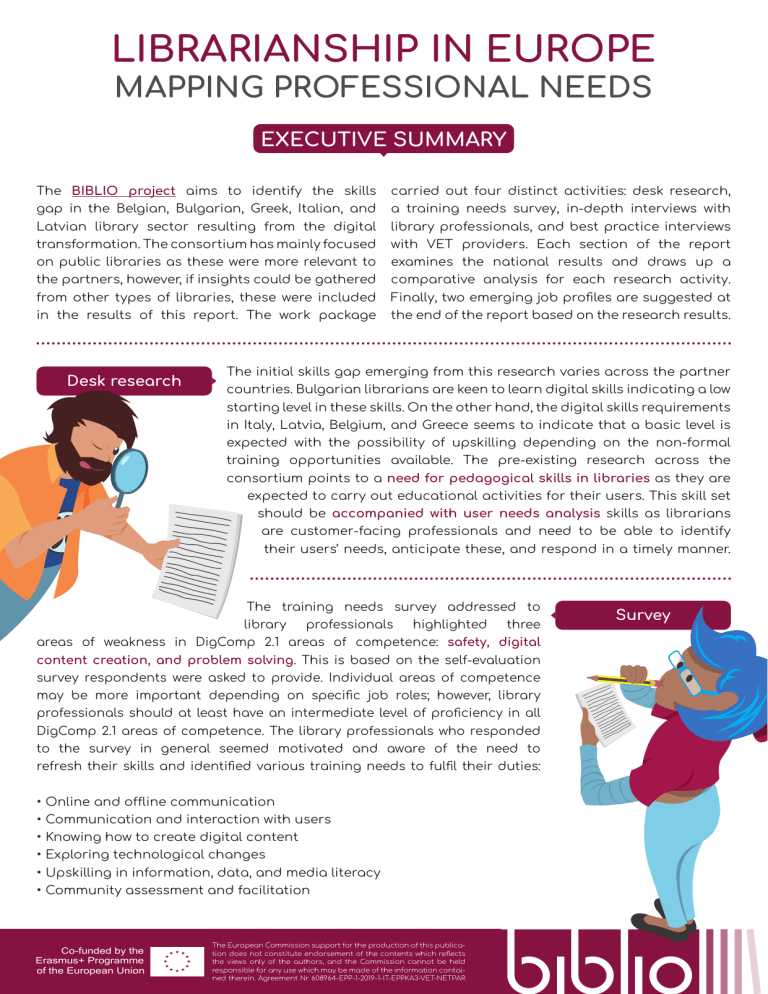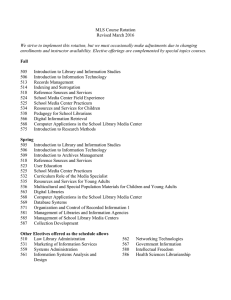
LIBRARIANSHIP IN EUROPE MAPPING PROFESSIONAL NEEDS EXECUTIVE SUMMARY The BIBLIO project aims to identify the skills gap in the Belgian, Bulgarian, Greek, Italian, and Latvian library sector resulting from the digital transformation. The consortium has mainly focused on public libraries as these were more relevant to the partners, however, if insights could be gathered from other types of libraries, these were included in the results of this report. The work package Desk research carried out four distinct activities: desk research, a training needs survey, in-depth interviews with library professionals, and best practice interviews with VET providers. Each section of the report examines the national results and draws up a comparative analysis for each research activity. Finally, two emerging job profiles are suggested at the end of the report based on the research results. The initial skills gap emerging from this research varies across the partner countries. Bulgarian librarians are keen to learn digital skills indicating a low starting level in these skills. On the other hand, the digital skills requirements in Italy, Latvia, Belgium, and Greece seems to indicate that a basic level is expected with the possibility of upskilling depending on the non-formal training opportunities available. The pre-existing research across the consortium points to a need for pedagogical skills in libraries as they are expected to carry out educational activities for their users. This skill set should be accompanied with user needs analysis skills as librarians are customer-facing professionals and need to be able to identify their users’ needs, anticipate these, and respond in a timely manner. The training needs survey addressed to library professionals highlighted three areas of weakness in DigComp 2.1 areas of competence: safety, digital content creation, and problem solving. This is based on the self-evaluation survey respondents were asked to provide. Individual areas of competence may be more important depending on specific job roles; however, library professionals should at least have an intermediate level of proficiency in all DigComp 2.1 areas of competence. The library professionals who responded to the survey in general seemed motivated and aware of the need to refresh their skills and identified various training needs to fulfil their duties: • • • • • • Online and offline communication Communication and interaction with users Knowing how to create digital content Exploring technological changes Upskilling in information, data, and media literacy Community assessment and facilitation Co-funded by the Erasmus+ Programme of the European Union The European Commission support for the production of this publication does not constitute endorsement of the contents which reflects the views only of the authors, and the Commission cannot be held responsible for any use which may be made of the information contained therein. Agreement Nr 608964-EPP-1-2019-1-IT-EPPKA3-VET-NETPAR Survey In-depth interviews Overall, the interviewees felt that upskilling was necessary throughout a library professional’s career in order to stay up to date with technological changes and have the relevant knowledge. Several respondents noted that librarians may feel confident in their media literacy abilities, however, they must regularly partake in training to have knowledge and skills relevant to the information landscape. Many respondents noted an issue with the lack of digital skills in libraries as there is a reliance on one or two staff members with the relevant skills. Therefore, establishing a strong foundation in basic digital skills for work in all staff members is needed to answer user queries and ensure a level of digital autonomy in library professionals. Notably some respondents felt that librarians need to be pushed to participate in nonconventional training. However, a key issue remains in the project countries; librarianship is still partially seen as inherently tied to the collections a library possesses. All the best practice interviews carried out address various areas of digital competence. In general, there is an acknowledgement that library services need to be more digital-oriented and library professionals need to be able to leverage digital tools to serve their communities. Interestingly, in Latvia, libraries are seen as “digital agents” that can reach a wide segment of the population and thus should be considered for citizen upskilling initiatives. This type of approach stands out amongst all the best practices as this intends to equip library professionals with up-to-date knowledge about e-services and make them an access point for digitally excluded library users. Based on these best practice interviews, there is a high need for blended learning opportunities to allow learners to balance professional and personal commitments. In light of the COVID-19 pandemic, programmes with online components were able to continue the delivery of at least theoretical modules with the possibility of convening learners when possible at a later time. Only a few of the best practices identified has online-only formats and many included some practical activities as part of their curriculum. Thus, as the BIBLIO VET curriculum will involve practical activities, a blended format that aims to deliver theoretical aspects online and brings learners together for in-person practical activities seems to be the best format. Several interviewees from different countries pointed out that they felt the collaborative and supportive environment they fostered provided a good opportunity for learners to learn from each other and create a support network between libraries. The learning experience delivered by BIBLIO should encourage a similar collaborative approach to foster an inter-European community that can also exchange best practices from each country. Co-funded by the Erasmus+ Programme of the European Union The European Commission support for the production of this publication does not constitute endorsement of the contents which reflects the views only of the authors, and the Commission cannot be held responsible for any use which may be made of the information contained therein. Agreement Nr 608964-EPP-1-2019-1-IT-EPPKA3-VET-NETPAR VET best practice interviews Job profiles Two distinct job profiles have been developed based on the training needs evoked by library professionals in the survey and in-depth interviews and national contexts: Community Engagement and Communication Officer and Digital Transformation Facilitator. The job profiles detailed in this report intend to respond to the communication and the community facilitation training needs for the former and the digitisation and technical support needed for the latter. They aim to boost digital skills in all library professionals to at least an “intermediate” level across all DigComp 2.1 areas. By enhancing digital and transversal skills that library professionals have, this will help the sector transition into the digital era and understand how to respond to new developments as technology continues to develop. The research carried out in the BIBLIO project delves into the skills needs of library professionals as a result of the digital transformation. This project opens the field to further research and developments in how digital technologies can be integrated in librarianship and the emerging skills needs around that. DIGY Co-funded by the Erasmus+ Programme of the European Union The European Commission support for the production of this publication does not constitute endorsement of the contents which reflects the views only of the authors, and the Commission cannot be held responsible for any use which may be made of the information contained therein. Agreement Nr 608964-EPP-1-2019-1-IT-EPPKA3-VET-NETPAR CECO

